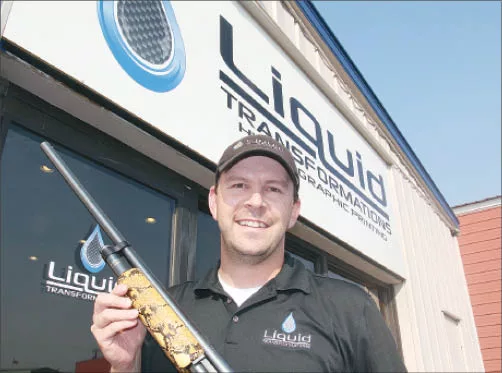H2-Oh! Using liquid to print

Whether applying pink camouflage to a motorcycle helmet or a burl wood trim look to a Cadillac's interior, Liquid Transformations LLC, of Spokane, specializes in creating a range of colorful designs on three-dimensional objects.
Co-owner Steve Waters says most customers relate the service to "camo dipping" or "3-D dipping," as featured on Discovery Channel's "American Choppers," a reality television series that centers on a father-son team that manufactures custom motorcycles. It's also called hydrographic printing or water transfer printing, he says.
"The process we use is something large manufacturers use, like a shotgun manufacturer usually has a large plant for this process," Waters says. "We've taken the materials and capabilities to a retail level. We can apply it to a custom job."
Founded in March by Waters and two business partners, Jeff White and Derek Noll, Liquid Transformations occupies a 3,000-square-foot building at 1707 E. Holyoke, and the three owners are its only employees.
The prices it charges vary depending on the number and size of the pieces to be imprinted with the desired pattern, and the complexity of the job, but typically range from less than $50 into the low thousands of dollars. For example, a seven-piece automotive interior job can run from $225 to $450.
Waters says the business will provide an estimate after viewing what a customer wants painted, and it also can take a digital photo image of an item to create a computer-generated overlay showing what an item would look like with a selected pattern.
As the business's name implies, water is central to the process it uses. It starts by applying a water-borne base paint to the client's item. Separately, a pattern is selected from a large variety of patterns imprinted on sheets of water-soluble film made of polyvinyl acetate. The pattern choices number into the hundreds, including wood grain, zebra stripes, skulls, snakeskin, camouflage, and brushed aluminum.
After a customer selects a design, the chosen sheet of film is placed into a tank of water heated to about 100 degrees. An activating agent then is sprayed on the film, which floats on the water's surface, and the client's item to which the design is to be applied then is dipped briefly into the tank. Once the item is removed from the tank, the design is essentially etched onto the base coat, followed up by the last step of applying a clear-coat finish.
"When we spray an activating agent, the film reanimates, like oil on water," Waters says. "It looks like magic when it's done."
Waters, White, and Noll got the idea for the business while working together doing car stereo installations, after hearing repeated customer requests for customized, patterned dashboards when dashboards were altered to accommodate newer stereo systems.
"We'd have people who wanted that wood-grained look," Waters says.
Vehicle dashboards often require body work to fit larger stereo units, and the hydrographic process can mask such retrofits. After studying 3-D printing, however, the trio saw the market for custom jobs on a number of items, including rifles and cell phone cases.
Car interior jobs now account for only a portion of Liquid Transformations' revenue, Waters says. About 50 percent of its work involves applying custom patterns to guns, as the hydrographic process has become particularly popular among area hunting enthusiasts, he says.
For example, a weathered stock and forearm on a rifle can get a new camouflage look. Liquid Transformations also did a custom job for a woman who has a competition archery bow. Other types of pieces to which it has applied patterns include cell phone covers, guitars, Xboxes, motorcycle parts, and light switch plates.
Waters says as a start-up business, Liquid Transformations hasn't had enough time to compare sales figures from month to month, but business activity has picked up steadily.
"We've noticed a spike in business even though the economy has been very strained," Waters adds. "We get very positive responses when we go to car shows and gun shows."
The business had booths recently at the River City Rod Run in Post Falls and the Goodguys Rod & Custom Association show in Spokane, and it plans to have one at the Spokane Gun Show this weekend.
At its retail store, customers enter to find an 800-square-foot showroom, where they can view samples of patterns available from among 70 that Liquid Transformations keeps in stock. Waters says additional patterns can be ordered, with more than 1,500 designs available.
The processing takes place in about 2,200 square feet in the back of the building, but Waters says the business has a live video feed via a webcam so customers can watch their items get dipped in real time.
Waters says a larger custom job on average can be completed within two to three weeks, and the process can be applied to just about any semi-flexible to rigid surface that's non-rubberized. The business can get some rush jobs done within two days.
As far as size, Liquid Transformations can handle anything that isn't larger than about 100 inches by 41 inches, and about three feet deep, "but we can do something by parts and pieces," Waters adds.
"We can do metal, plastic, glass and wood," he says. "Basically, if we can paint it, we can dip it."
For a job on a 1949 Cadillac convertible, the business created burl wood interior trim. The car recently won a best of show award in a Walla Walla, Wash., car show, Waters says.
"We control all of our process in house," he adds. "Our catch slogan is 'Make It Yours.'"
Related Articles

_c.webp?t=1763626051)

_web.webp?t=1764835652)
